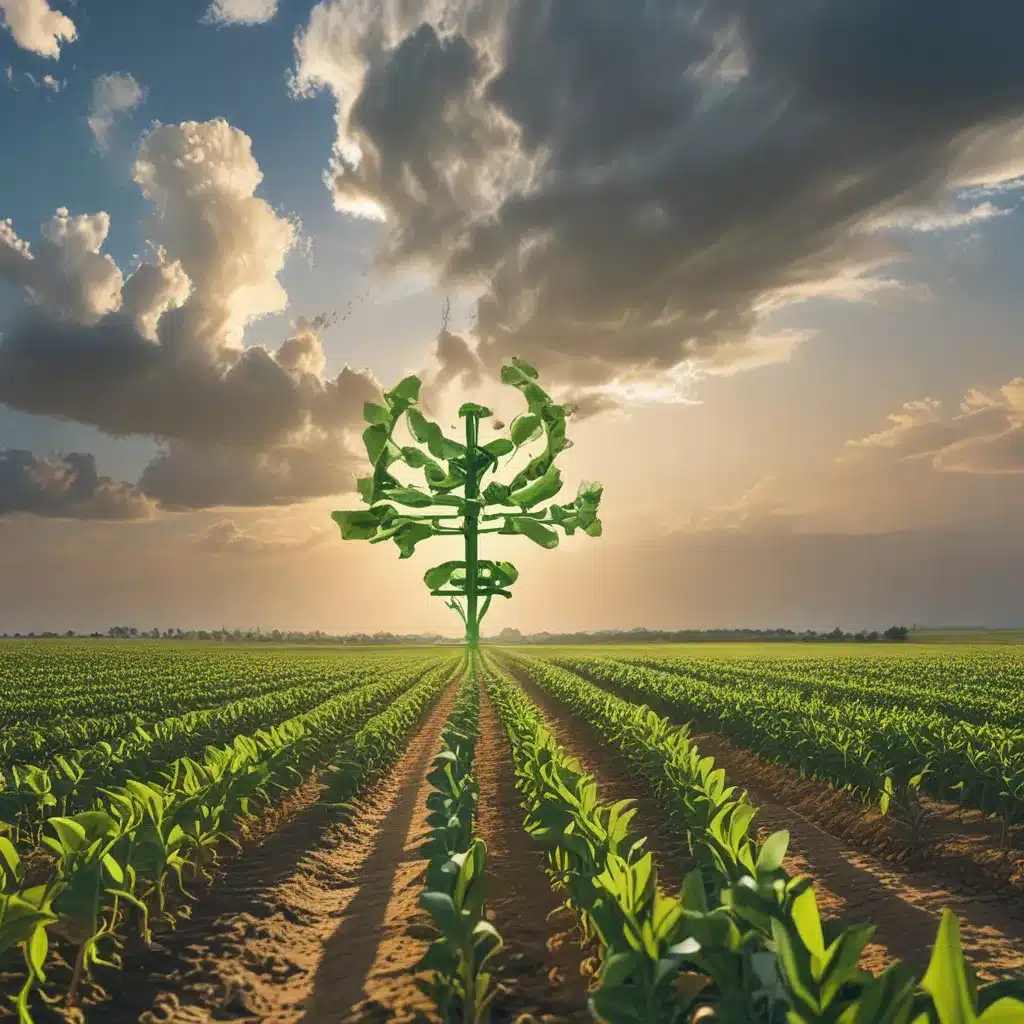
The Agricultural Transformation: A Digital Renaissance
When I first heard about the advancements in agricultural technology, I must admit, I was a bit skeptical. As someone who grew up on a small family farm, the idea of modernizing age-old farming practices seemed almost sacrilegious. But as I delved deeper into the world of agritech, I quickly realized that innovation isn’t just the future – it’s the present.
The agricultural industry has long been dominated by traditional methods, passed down from generation to generation. But what if I told you that a digital revolution is underway, one that’s poised to transform the way we grow, harvest, and distribute our food? Welcome to the era of smart farming, where cutting-edge technologies are harnessing the power of artificial intelligence (AI) to revolutionize crop yield and resource management.
Precision Farming: The Rise of AI-Driven Agriculture
Imagine a world where farmers can precisely monitor the health of their crops, predict weather patterns, and optimize resource allocation – all with the help of AI. This isn’t some futuristic fantasy; it’s the reality that innovative agritech startups are bringing to life. Companies like Farmers Edge are leading the charge, using advanced sensor technology and machine learning algorithms to provide farmers with unprecedented insights into their operations.
By analyzing vast datasets on soil composition, weather trends, and plant growth, these AI-powered platforms can help farmers make more informed decisions about irrigation, fertilization, and pest management. Imagine being able to predict the optimal time to sow your seeds or identify a disease outbreak before it spreads across your entire crop. That’s the power of precision farming, and it’s transforming the way we think about agriculture.
The Data-Driven Advantage: Maximizing Yield and Minimizing Waste
But the benefits of AI-driven agriculture extend far beyond just crop health and yield optimization. Innovative startups are also harnessing the power of AI to streamline resource management and minimize waste. By analyzing real-time data on soil moisture, weather patterns, and crop growth, farmers can make more informed decisions about water usage, fertilizer application, and energy consumption.
Imagine a world where your irrigation system automatically adjusts based on predicted rainfall, or where your tractors optimize their fuel efficiency based on terrain and load. These are the kinds of advancements that are revolutionizing the way we approach farming, and the results are nothing short of remarkable. Farmers who have embraced these AI-powered technologies have reported up to a 20% increase in crop yields, while simultaneously reducing their water usage and carbon footprint.
The Future of Agritech: Embracing Sustainability and Scalability
But the true power of AI-driven agriculture lies not just in its ability to boost productivity and efficiency, but in its potential to create a more sustainable future for our planet. As the world population continues to grow, the demand for food is skyrocketing, putting immense pressure on our natural resources. By harnessing the power of AI, we can develop more efficient and eco-friendly farming practices that minimize our impact on the environment.
Imagine a future where drones equipped with hyperspectral cameras monitor crop health and identify pest infestations, allowing farmers to target their pest control efforts with laser-like precision. Or where autonomous tractors and harvesters navigate fields with pinpoint accuracy, reducing soil compaction and minimizing waste. These are the kinds of advancements that are not only transforming the way we grow our food, but also paving the way for a more sustainable agricultural future.
A New Era of Farming: Empowering Smallholder Farmers
But the true beauty of AI-driven agriculture lies in its potential to empower smallholder farmers, the backbone of the global food system. At Thornapple CSA, we believe that by embracing these innovative technologies, we can level the playing field and provide even the smallest farms with the tools they need to thrive.
Imagine a world where a small family farm in a developing country can access the same cutting-edge data analytics and precision farming tools as a large-scale commercial operation. By democratizing access to these technologies, we can help smallholder farmers boost their productivity, reduce their resource usage, and ultimately, improve their livelihoods.
The Agritech Revolution: Inspiring Success Stories
The transformation of the agricultural industry is well underway, and the inspiring success stories of agritech innovators are proof of the incredible potential of these technologies. Take the example of Farmers Edge, a Canadian company that has developed a suite of precision farming tools powered by AI and machine learning. By providing farmers with real-time data on soil health, weather patterns, and crop growth, Farmers Edge has helped its clients boost their yields by up to 20% while reducing their water usage by as much as 10%.
Or consider the case of Trace Genomics, a startup that’s using AI to analyze soil microbiomes and provide farmers with customized recommendations for fertilizers and crop treatments. By leveraging the power of data and machine learning, Trace Genomics has helped farmers improve their soil health and increase their crop yields by up to 15%.
Embracing the Future: A Call to Action
As we look to the future, the potential of AI-driven agriculture is nothing short of breathtaking. By harnessing the power of these innovative technologies, we can create a more sustainable, efficient, and equitable food system that can feed the world’s growing population.
But the true power of this transformation lies not just in the technology itself, but in the collective effort to embrace it. Whether you’re a large-scale commercial farmer or a small-scale backyard grower, the opportunity to be a part of this agricultural revolution is within your grasp.
So, let’s come together and explore the boundless possibilities of smart farming. Let’s harness the power of AI to revolutionize crop yield, minimize resource waste, and pave the way for a more sustainable future. The time to act is now, and the rewards are truly limitless.



